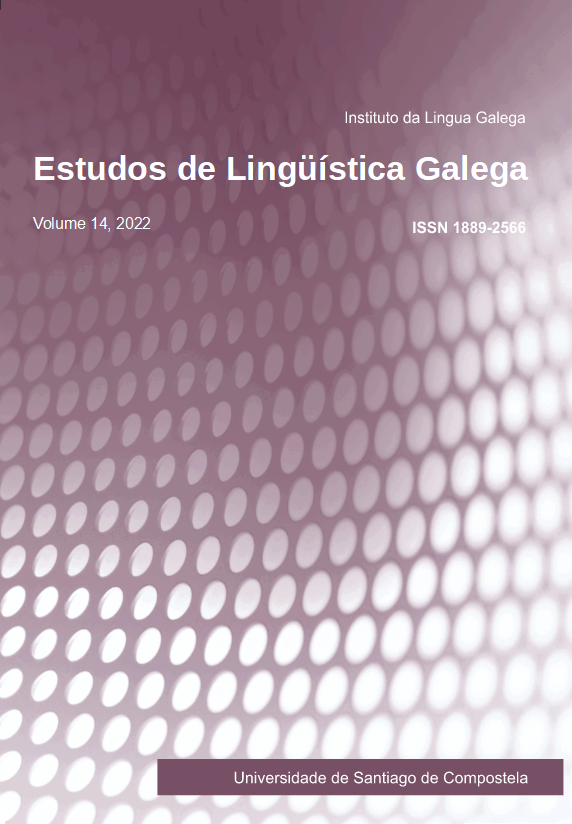The Galician alternative economic discourse: a new cognitive frame analysis
Main Article Content
Abstract
Our purpose in this paper is an analysis of the discourse of some Galician activist groups which defend an alternative economic model opposite to the model that prevails nowadays. This discourse takes place in a context of economic and political crisis, and tries to fulfil citizens’ demands to resolve the problems they are suffering. A new system that also requires a new ideological construction, produced and transmitted through innovative discursive practices. This is the reason we approach the analysis from two theoretical perspectives: socio-cognitive and rhetorical-constructivist. We consider this varied theoretical framework, which begins with the reasons why there is a need to new ways of communication in such situations of crisis and continues with references to more discursive issues. Among these, we emphasize language conception as a way of achieving power, in the line of Critical Discourse Analysis, and as a creator of alternative realities. In this sense, discourse is able to activate new cognitive frames, by using discursive and rhetorical devices that configure certain conceptual schemes and function like arguments in the persuasive text. With this theoretical approach we show how these groups’ discourses construct an interpretive frame based on three points: social, environmental and local perspectives. From the argumentative point of view, this frame strongly opposes to the capitalist economical trying to involve citizens in new ways of life.
Keywords:
Article Details
References
Chilton, Paul (2004): Analysing political discourse. Theory and Practice. Londres: Routledge.
Chilton, Paul (2005): “Missing links in mainstream CDA: Modules, blends and the critical instinct”, en Ruth Wodak / Paul Chilton (eds.), A New Agenda in (Critical) Discourse Analysis. Theory, methodology and interdisciplinarity. Amsterdam / Philadelphia: John Benjamins, 19-51. http://dx.doi.org/10.1075/dapsac.13.05chi.
Condor, Susan / Charles Antaki (1997 /2000): “Cognición social y discurso”, en Teun A. Van Dijk (coord.), El discurso como estructura y proceso. Londres: Sage, 1997; Barcelona: Gedisa, 2000: 453-489.
Cuéllar, Mª del Carmen / Jeannette Villa (1997): “Empleo metafórico y discurso de especialidad”, Thélème 11, 239-247. http://revistas.ucm.es/index.php/THEL/article/viewFile/THEL9797120239A/33955.
Cuvardic García, Dorde (2005): “La metáfora en el discurso político”, Reflexiones 83/2, 61-72. http://www.vinv.ucr.ac.cr/latindex/reflexiones-83-2/05-CUVARDIC.61-72.indd.pdf.
Fairclough, Norman (2003): Analysing Discourse. Textual analysis for social research. Londres: Routledge.
Flensburg, Alexander (2010): El uso de la metáfora en los discursos de Evo Morales. Uppsala Universitet. Memoria de licenciatura inédita. http:// www.diva-portal.org/smash/get/diva2:392788/FULLTEXT01.pdf.
Gerbner, George (1956): “Toward a general model of communication”, Audio Visual Communication Review 4, 171-199. http://dx.doi.org/10.1007/bf02717110.
Goffman, Erving (1974/2006): Frame Analysis. An essay on the organization of experience / Frame Analysis. Los marcos de la experiencia. Londres: Harper and Row, 1974; Madrid: Centro de Investigaciones Sociológicas, 2006. http://dx.doi.org/10.2307/2106908.
Koch, Ingedore G. Villaça / A. C. Bentes / M. M. Cavalcante (2007): Intertextualidade. Diálogos Possíveis. São Paulo: Cortez.
Lakoff, George (2004/2007): Don’t Think of an Elephant: Know Your Values, Frame the Debate / No pienses en un elefante: lenguaje y debate político. Vermont: Chelsea Green, 2004; Madrid: Editorial Complutense, 2006.
Lakoff, George / Mark Johnson (1980/2009): Metaphors We Live By / Metáforas de la vida cotidiana. Chicago: University, 1980; Madrid: Cátedra, 2009. http://dx.doi.org/10.1037/h0063098.
Newcomb, Theodore M. (1953): “An approach to the study of communicative acts”, Psychological Review 60, 393-404.
Perelman, Chaïm (1977/1997): L’Empire rhétorique / El Imperio retórico: retórica y argumentación. París: Vrin, 1977; Bogotá: Norma, 1997.
Perelman, Chaïm / Lucie Olbrechts-Tyteca (1958/ 1989): Traité de l’argumentation: La nouvelle rhétorique. / Tratado de la argumentación. La nueva retórica. París: Presses Universitaires de France, 1958; Madrid: Gredos, 1989.
Pujante, David / Esperanza Morales López (2013): “Discurso (discurso político), constructivismo y retórica: los eslóganes del 15-M”, Language, Discourse & Society 2/2, 33-59. http://www.language-and-society.org/journal/issues/html.
Sánchez García, Francisco José (2009): “Usos metafóricos del lenguaje político español. La metáfora estructural en los debates sobre el estado de la nación”, en Pascual Cantos Gómez / Aquilino Sánchez Pérez (eds.), A Survey on Corpus-based Research. Panorama de investigaciones basadas en corpus. Murcia: AELINCO, 989-1007. http://www.um.es/lacell/aelinco/contenido/pdf/67.pdf.
Scollon, Ron / Suzanne Wong Scollon (2000/2001): Intercultural communication. Massachusetts: Blackwell, 2000; Massachusetts: Blackwell, 2001.
Thays, Adrián (2010): “La metáfora conceptual en el discurso político venezolano: Rómulo Betancourt y Hugo Chávez Frías”, Aled 10/1. http://aledportal.com/wp-content/themes/aled/descargas/10-1.pdf.
Van Dijk, Teun A. (1998/1999): Ideology: A Multidisciplinary Approach / Ideología. Una aproximación multidisciplinaria. Londres: Sage, 1998; Barcelona: Gedisa, 1999.
Van Eemeren, Frans H. / Robert Grootendorst (1983): Speech acts in argumentative discussions. A theoretical model for the analysis of discussions directed towards solving conflicts of opinion. Dordrecht: Foris.
Wodak, Ruth / Michel Meyer (eds.) (2001): Methods of Critical Discourse Analysis. Londres: Sage.






